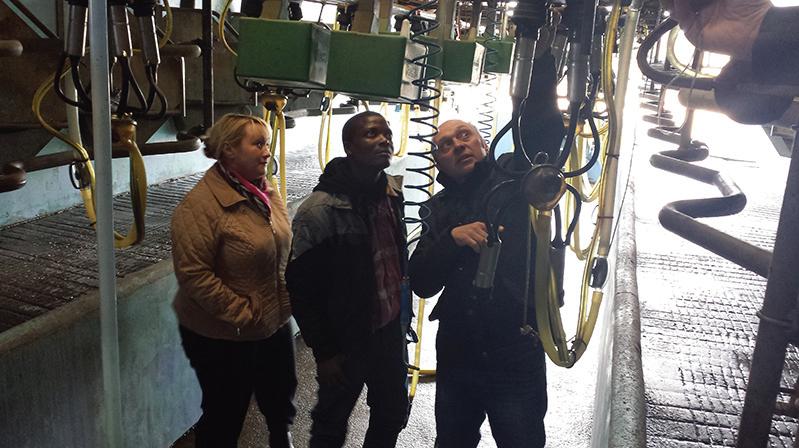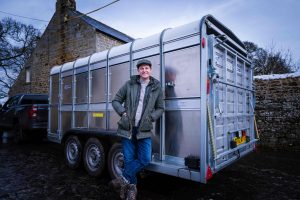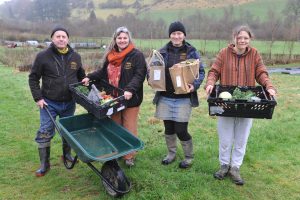CHALLENGES and problems that farmers in the UK face are not so different to those faced by farmers in Malawi, a delegation of Farmers’ Union of Wales officials has heard.
Visiting a Welsh organic arable and dairy farm – Allan Saidi a sugar farmer from Malawi – told FUW president Emyr Jones that the challenges of trying to achieve a fair price for their produce in order to provide a brighter future for their children are just the same in Africa as they are here in Wales.
The delegation was joined by the deputy minister for farming and food, Rebecca Evans AM, as they explored FUW Ceredigion county chairman Aled Rees’s150-acre organic dairy farm at Trefere Fawr, Penparc, Cardigan.
Following the visit the deputy minister for farming and food, Rebecca Evans AM said: “It was a pleasure to meet Allan last week and hear about how Fairtrade is transforming lives and helping people out of poverty in Malawi. Becoming the first Fair Trade Nation was a huge moment for Wales. It showed the world that we are an outward-looking, compassionate country which cares about ensuring farmers and food producers receive a fair deal wherever they are.”
“It was an absolute pleasure to show Allan around the farm and hear about the challenges a farmer on the other side of the world faces. It has become quite clear that even though we tend land many miles apart we worry about very similar things –floods, prices, cost of production and how to improve the lives of our families on a day-to-day basis,” said Mr Rees.
“It is easy to forget how fortunate we are living in the western world and take things like running water, safety, health care and education for our children for granted. What Allan and his fellow sugarcane farmers have achieved over the years can only be admired and must be supported in whatever way we can.
“Achieving a fair price for our produce plays a major role in this. Of course we have to take responsibility for running efficient businesses and producing a quality product but if we don’t get paid fairly for our efforts we cannot expand and further invest in the industry,” added Mr Rees.
Speaking after the visit, FUW president Emyr Jones added: “As much as the union and every farmer in the UK want a fair price for dairy, meat and arable produce in the market place we also want to see farmers like Allan get a fair price for his products. The two principles should have equal priority worldwide.”
Mr Saidi, 27, who has been farming sugarcane for over ten years, is also secretary of the Fairtrade Premium Committee – the elected committee which manages projects chosen by Kasinthula Cane Growers’ Association (KCGA) members. The members decide what community projects should benefit from the Fairtrade Premium received, with funds being invested in services such as communally owned agricultural machinery, school buildings and a community leisure centre.
“Malawi’s sugar sector is vital for the country’s economy – in 2013 sugar exports were worth $114m, making it the second most important export commodity after tobacco. Sugar is grown as a mono-crop and is generally the main source of income for smallholder producers, who also grow food crops and keep livestock. Agriculture provides a livelihood for over 85 percent of the population, of which around 90 percent are smallholders,” said Mr Saidi.
“KCG is a smallholder sugar cane project located in an inhospitable region of southern Malawi. Long droughts occasionally result in famine, and the twice-yearly rains often bring floods – in January 2015 many farmers were affected by Malawi’s worst floods for fifty years that killed several hundred people, displaced thousands more and caused extensive damage to crops, livestock and infrastructure.
“Literacy levels are low and poverty is widespread in the region. Most people live in basic mud huts with thatched roofs and few can afford to keep livestock. Families make a living growing maize, cassava or rice, while others earn cash from sugar cane or cotton, or by labouring on nearby sugar plantations. Other challenges faced by farming communities include high input costs, poor rural infrastructure, inadequate health facilities, and a lack of agricultural extension services and appropriate technology,” added Mr Saidi.
FUW policy officer Helen Ovens, who has previously worked with farmers in Uganda, said: “I have seen first-hand the benefits of growing a cash crop -even on a very small scale-alongside crops grown to feed the family.
“Sugarcane is a high value crop, bringing in much needed income into deprived rural communities, and helps to pay for essential services. Allan and his fellow farmers produce a particularly high value product – that being organic, fair trade sugar.The quality of this product, and the real tangible benefits to his community that arise from us purchasing products with a Fair Trade logo should not be underestimated.”
“Farmers across the world need to receive a realistic financial return for their products, whether that be sugarcane from a small farm in southern Malawi, or milk from a dairy farm in west Wales. It has been a pleasure to see Aled and Allan exchange farming experiences, increasing each other’s understanding of their own farming circumstances,” added Helen.


















Add Comment